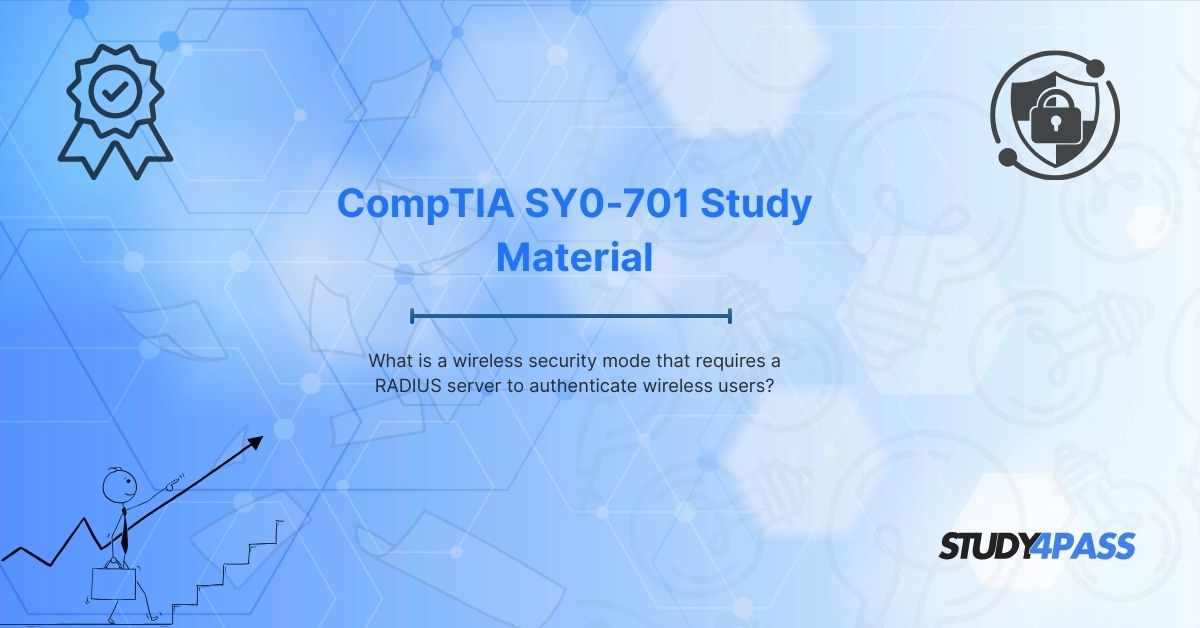Introduction
In today's digital landscape, securing wireless networks is crucial to prevent unauthorized access and data breaches. One of the most secure methods for authenticating wireless users involves using a RADIUS (Remote Authentication Dial-In User Service) server. This article explores wireless security modes that require RADIUS authentication, their importance, and how they fit into the CompTIA Security+ (SY0-701) certification objectives.
Additionally, if you're preparing for the CompTIA Security+ exam, reliable study resources like Study4Pass can help you master these concepts efficiently.
What is a RADIUS Server?
A RADIUS server is a centralized authentication, authorization, and accounting (AAA) server that verifies user credentials before granting network access. It is commonly used in enterprise environments to manage secure wireless authentication.
Key Functions of a RADIUS Server:
- Authentication – Verifies user credentials (username/password, certificates).
- Authorization – Determines what resources a user can access.
- Accounting – Logs user activities for auditing purposes.
Wireless Security Modes Requiring RADIUS Authentication
Several wireless security modes rely on a RADIUS server for authentication. The most notable ones include:
1. WPA2-Enterprise (IEEE 802.1X)
- Description: WPA2-Enterprise is the gold standard for secure wireless networks in business environments.
- Authentication Method: Uses EAP (Extensible Authentication Protocol) with a RADIUS server.
- Security Features:
- Dynamic encryption keys (AES-CCMP).
- Per-user authentication.
- Supports multiple EAP types (EAP-TLS, PEAP, EAP-TTLS).
- Use Case: Large organizations requiring high-security wireless access.
2. WPA3-Enterprise
- Description: The latest Wi-Fi security protocol, improving upon WPA2-Enterprise.
- Authentication Method: Also uses EAP with a RADIUS server.
- Security Enhancements:
- 192-bit cryptographic strength (CNSA suite).
- Forward secrecy prevents decryption of old traffic if a key is compromised.
- Protection against offline dictionary attacks.
- Use Case: Government, military, and high-security enterprises.
3. 802.1X (Port-Based Network Access Control)
- Description: A framework for network access control, often used with WPA2/WPA3-Enterprise.
- Authentication Method: RADIUS-based authentication.
- Security Features:
- Prevents unauthorized devices from connecting.
- Works with wired and wireless networks.
- Use Case: Corporate networks requiring strict access control.
Why Use RADIUS for Wireless Security?
Advantages of RADIUS Authentication
- Centralized Management – Simplifies user authentication across multiple access points.
- Stronger Security – Eliminates weak pre-shared keys (PSK) used in WPA2-Personal.
- Scalability – Ideal for large organizations with many users.
- Audit and Compliance – Logs authentication attempts for regulatory compliance.
Disadvantages
- Complex Setup – Requires a dedicated RADIUS server (e.g., FreeRADIUS, Microsoft NPS).
- Cost – Enterprise solutions may require additional hardware/software.
CompTIA Security+ (SY0-701) Relevance
Understanding RADIUS-based wireless security is critical for the CompTIA Security+ SY0-701 exam. Key topics include:
Exam Objectives Covered:
- 1.4 Given a scenario, implement secure network designs.
- WPA2/WPA3-Enterprise configurations.
- 802.1X authentication.
- 3.6 Explain authentication and authorization controls.
- RADIUS/TACACS+ differences.
- EAP authentication methods.
Study Tips for SY0-701:
- Memorize EAP Types: EAP-TLS (certificates), PEAP (password-based), EAP-FAST.
- Understand RADIUS vs. TACACS+:
- RADIUS – Combines authentication & authorization (UDP port 1812).
- TACACS+ – Separates AAA functions (TCP port 49).
- Practice Configurations: Use labs to set up a RADIUS server with WPA2-Enterprise.
How Study4Pass Can Help You Pass CompTIA Security+?
Preparing for the CompTIA Security+ (SY0-701) exam requires high-quality study materials. Study4Pass offers:
Why Choose Study4Pass?
- Comprehensive Study Guides – Covers all SY0-701 objectives, including wireless security.
- Practice Exams – Simulates real exam questions on RADIUS, EAP, and WPA3.
- Hands-On Labs – Learn to configure RADIUS servers and enterprise Wi-Fi security.
- Up-to-Date Content – Aligned with the latest CompTIA exam changes.
- Expert Explanations – Simplifies complex topics like 802.1X and EAP methods.
Get Started Today!
Visit Study4Pass for the best SY0-701 study materials and ensure your success in the CompTIA Security+ exam!
Conclusion
Wireless security modes like WPA2-Enterprise, WPA3-Enterprise, and 802.1X rely on RADIUS servers for secure authentication. These methods provide stronger security than pre-shared keys and are essential for enterprise networks.
For CompTIA Security+ (SY0-701) candidates, mastering these concepts is crucial. Study4Pass provides the best resources to help you understand RADIUS authentication, EAP methods, and wireless security configurations ensuring you pass the exam with confidence.
Start your journey today with Study4Pass and ace your Security+ certification!
Special Discount: Offer Valid For Limited Time “SY0-701 Exam Prep Practice Test”
Actual Exam Questions For CompTIA's SY0-701 Study Guide
Sample Questions for CompTIA SY0-701 Exam Topics
1. Which wireless security mode requires a RADIUS server for user authentication?
a) WPA2-Personal
b) WPA3-Personal
c) WPA2-Enterprise
d) WEP
2. What type of authentication server is used in WPA-Enterprise mode?
a) DNS Server
b) DHCP Server
c) RADIUS Server
d) FTP Server
3. Which of the following security protocols is commonly paired with a RADIUS server for enterprise wireless networks?
a) WPA-PSK
b) WEP
c) WPA2-Enterprise
d) Open Authentication
4. Why is a RADIUS server used in enterprise wireless security?
a) To assign IP addresses dynamically
b) To centrally authenticate users with credentials
c) To encrypt web traffic
d) To block all wireless connections
5. Which security mode does NOT require a RADIUS server?
a) WPA2-Enterprise
b) WPA3-Enterprise
c) WPA2-Personal
d) 802.1X Authentication


